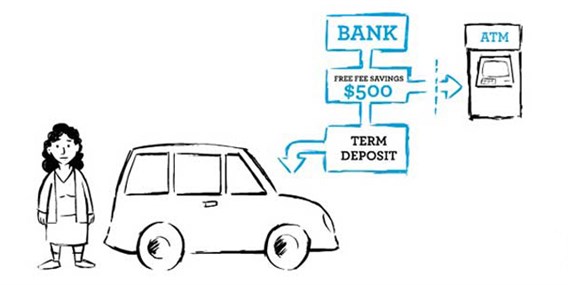-
Financial literacy in young adults
Financial literacy is increasingly being acknowledged as an integral part of ongoing financial stability.
According to the Australian Council for Educational Research (ACER) that insight is reflected in a growing number of governments developing dedicated national strategies for financial education. The report found in Australia financial literacy subjects were already being integrated into the Australian education curriculum.
Financial literacy is a particular concern in the young with ANZ’s Adult Financial Literacy in Australia survey identifying those under 25 years as a key group with low financial literacy. The report also identified people with no formal post-secondary education; people with relatively low levels of income (e.g. those whose main source of income is a Government benefit or allowance; those with annual household incomes below $25,000; those with less than $2,000 in savings and investments); those working in lower blue collar corporations; and females as other groups with lower levels of financial literacy.
According to ACER’s report, the major contributing factors to low financial literacy in these demographics were found to be financial knowledge and numeracy; financial attitudes; household income; and education and occupation.

The key to addressing low financial literacy is education.
To be successful in increasing financial literacy, financial education needs to be comprehensive and cover all of the above factors, rather than just basic financial skills.
ACER says financial literacy is “contingent on some knowledge and understanding of fundamental elements of the financial world, including key financial concepts as well as the purpose and basic features of financial products. This also includes risks that may threaten financial well-being as well as insurance policies and pensions.”
“Programs focused solely on raising financial knowledge and numeracy may be effective in improving components of financial literacy only, however their effect on planning ahead is likely to be more limited,” says ACER.
“Programs that also take into account and seek to positively influence people’s financial attitudes are likely to be more effective than those that do not. Financial self-efficacy, which is a measure of confidence in dealing with money and of willingness to engage with money management, is positively associated with all components of financial literacy.”
Dealing with finances is often found to be a stressful task for many people. Research found 36 per cent of people find dealing with money stressful - even when things are going well.
“To be effective financial literacy programs need to: find a way to engage people and help to overcome the stress some people associate with dealing with money and build confidence in managing money”, says ACER.

MoneyMinded is ANZ’s adult financial literacy program which aims to deliver financial education that has a fundamental impact on financial literacy levels.
In the previous 12 months, an estimated 43,646 individuals participated in MoneyMinded education across Australia and the Asia Pacific region either in a workshop or in one-to-one counselling. The program also received a MoneySmart week outstanding achievement award in 2013.
According to ANZ’s latest MoneyMinded report, the most common characteristics of MoneyMinded participants in Australia overlapped substantially with the ACER findings and included sole parents, those who are unemployed, people from Non-English Speaking Backgrounds (NESB) and young people.
From 23 July 2014 you can develop your financial skills on the new MoneyMinded site.
he MoneyMinded program aims to help participants by improving savings behaviour; moving away from ‘making ends meet’; coping with unexpected expenses; setting longer-term goals; informed financial decision-making.
MoneyMinded facilitators say “young people can benefit greatly from the program; [the] program is very valuable to our clients as they are of an age where this subject matter is very important as they enter into independent living”. 11.6 per cent of MoneyMinded participants in the last 12 months were young people.
“The program is current and handles the issues that are happening to young disengaged people rather well”.
According to the MoneyMinded report, the MoneyMinded program increased young people’s financial knowledge and confidence levels, encouraged them to save rather than spend and broadened their financial horizons.
The major focus of the MoneyMinded program is to equip individuals with the knowledge of “what to look for and where to access information about products and services when the need arises … reducing the likelihood of choosing inappropriate products and services that may be detrimental to a young person’s financial future”. This is particularly relevant when educating the young.
“No one had ever taught me how to manage my money before,” says Quy a MoneyMinded participant in Vietnam. Following the program Quy says he is a more financially confident and independent young man.
“Before MoneyMinded, I only had one bank account and spent the money in this account freely without checking what remained in the balance,” says Jun Wei, MoneyMinded participant in Singapore. “After MoneyMinded, I opened a second savings account and I now put half my salary into this account every month. I make a point not to touch my savings. MoneyMinded also inspired me to create a simple budget for myself using a spreadsheet.”
The MoneyMinded report found that the youth in many of the Asia Pacific countries - where the program was delivered - are the first generation to grow up in a monetised environment and have not therefore had the opportunity to learn money management skills from their parents.
According to the World Bank providing opportunities to youth to develop financial capabilities at an ideal ‘teachable moment’ such as when they enter the workforce will help to promote the financial health of their communities.
Jennifer Farmer - BlueNotes Editorial Producer.
The views and opinions expressed in this communication are those of the author and may not necessarily state or reflect those of ANZ.
anzcomau:Bluenotes/social-and-economic-sustainability,anzcomau:Bluenotes/social-and-economic-sustainability/financial-literacy
Financial education to future proof young adults
2014-07-23
